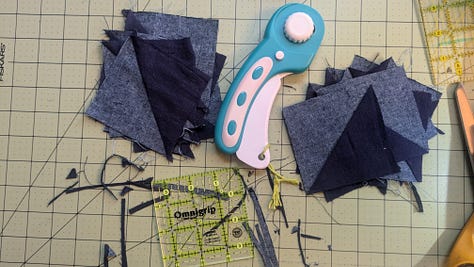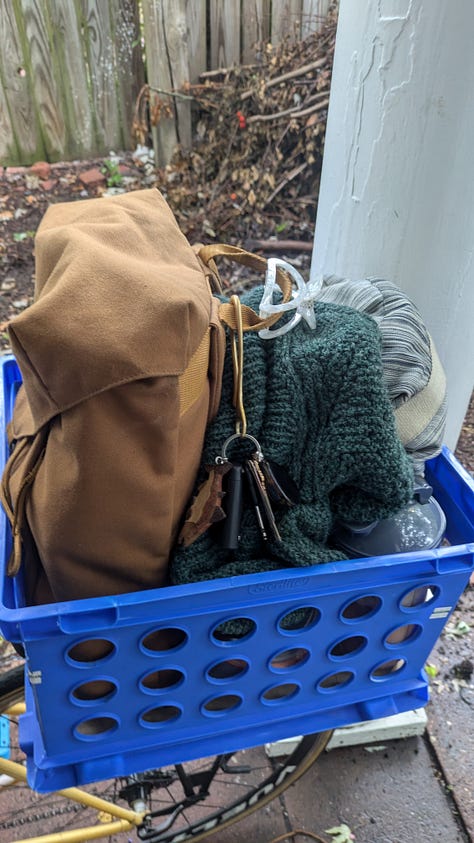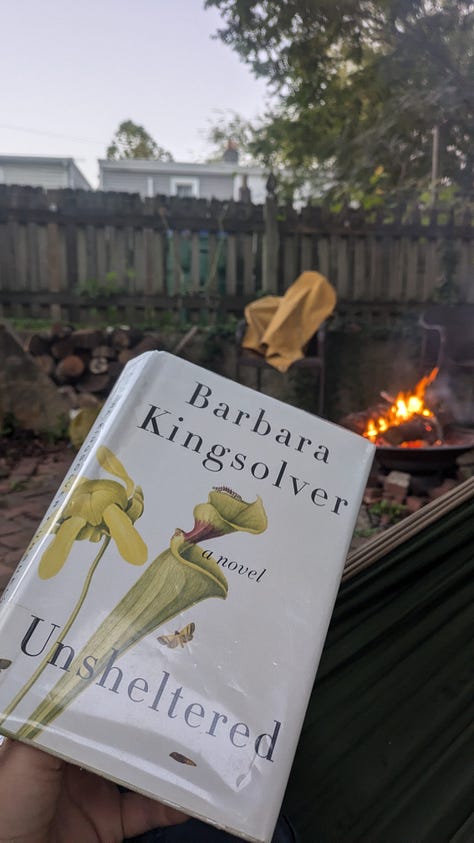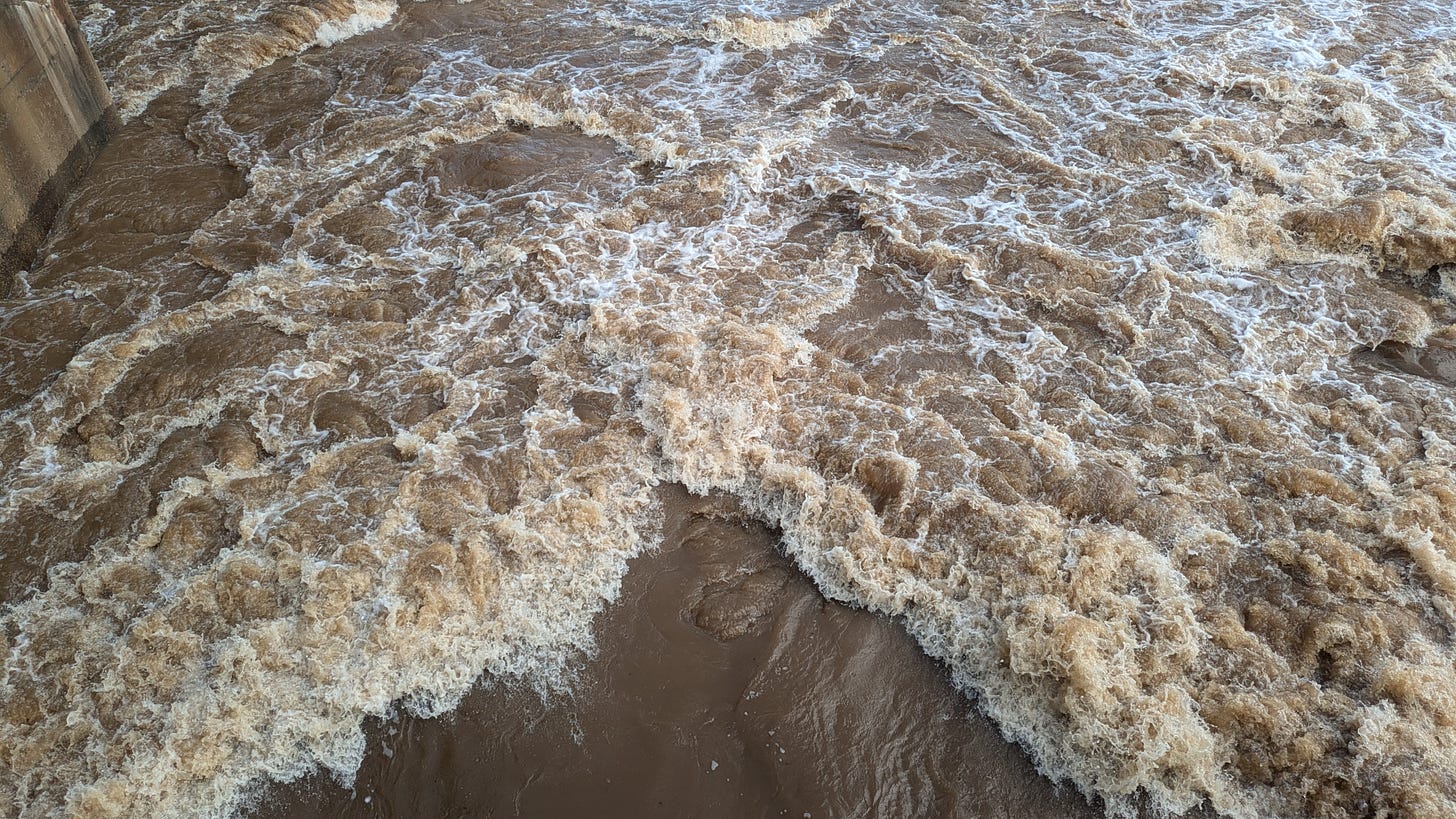High Water
Hello from the first month of Fall
October 20, 2024, 10:10, flood tide, waning gibbous, Early Fall
High 75ºF/ Low 43ºF, sunny, pressure 1025 mb, 4.37 feet
The words aren’t falling out of my brain and into my fingers quite like they usually do, or perhaps like I always hope they will.
Summer has given way to fall. The windows are open and the first leaves are crunching underfoot, beginning the process of letting go. My hair is wet from a bath, my legs are sore from a run, and my belly is full of foods roasted yesterday and fetched from a stand on the side of the road. Like the trees, I’m sending energy back to my roots to prepare for winter.
Hurricane season is here.
The storms start as hot dry air over the Sahara, intensify on the Atlantic, and change trajectory in the Gulf of Mexico. Media feeds have been flooded with brown and whitewater in unfathomable locations. For a year we have witnessed genocide through the same screens. For longer than that, we have been aware of sorrows and joys, amazed by humanity’s capacity for innumerable reasons. It’s all more than one person can absorb, let alone transmute but we are alive now, facing the storms before us, doing what we can with what we have.
I spent the Spring and Summer paddling an increasingly shallow river.
The water receded inch by inch and the rocks revealed the path between. I got stuck and unstuck countless times. I checked the river gauge daily and learned the difference between 3.5’ and 3.8’. I felt the rain west of here, and the relief of how a few extra inches could help me move us downstream. The presence of customers and pay kept my moods in check. The oceans had taught me to be wild, tenacious, far-reaching, and at peace alone. The river taught me to focus and flow and bring others along.
Low water is tricky, there may only be one narrow path for the raft to travel. With repetition, I recognized the distinct rocks, trees, and other features that showed the way, learning from senior guides and the best teacher of all — trial and error. Being a river guide gave me the confidence to start teaching sewing classes and to reach a little higher in other public-facing roles. After sailing so many miles on watch alone, taking my turn to take care of us at the helm, it was a delight to have more people ride in my relatively simple raft and help them face their fears and have some fun.
I learned that I love being in situations that challenge my ability to keep cool and expand my capacity. I recovered the biggest lesson of our sailing trip — that it never helps to be stressed out. I once woke up for my shift with water over the floorboards of our beloved sailboat, fifty miles offshore. Surviving something like that did wonders for my stress tolerance, but it also took a toll. Two seasons on the river was the medicine I needed to put those troubles to good use.
After months of playing in the 3.5-4’ range, the river level jumped nine feet when Hurricane Helene moved through the East Coast. I went out paddling twice, once for recreation and again for training. New routes downriver were open and the lap that usually takes 2-3 hours was done in 45 minutes. We floated over dams that are lethal at lower levels and the big waves were like the confused seas of the Caribbean.
Life is now rushing ahead like the river and I need less precision and more presence to stay afloat. My river time has expanded my ability to look downstream, an activity that alluded us for the years of living at the pace of the weather on open seas.
After the initial reporting of Helene in Appalachia, my social media quickly shifted to local supply collection efforts for Western NC and videos of rafts and kayaks getting to homes made inaccessible by the water. The paddlers were leading the way.
For years, there has been a debate about personal vs collective action in response to the climate crisis, and I sense that we’ve swung, rightfully so, toward demanding systematic changes. This is a logical leap as the scale and interconnection of crises become increasingly known, but it doesn’t do much to mitigate a future that is looking increasingly precarious. Knowing how to read water and steer a raft won’t change the world, but the paddlers in North Carolina are proving it helps when the usual safety nets are flooded.



I’m settling into the coming cold weather and new time at a desk with soft structure: training for a triathlon, sewing a big quilt, and maxing out my library card. This is a tough season to stay with ourselves, rather than get carried off by the quickly moving news and images on our screens. For me, movement, crafts, and stories always help.



I’m figuring out how writing fits into this new season but promise a guest post from a wise friend, a sauerkraut guide, and continued musings on shifting to land from sea.
Posts referenced in this post:




